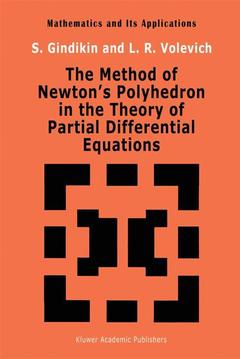The Method of Newton’s Polyhedron in the Theory of Partial Differential Equations, 1992 Mathematics and its Applications Series, Vol. 86
Langue : Anglais
Auteurs : Gindikin S.G., Volevich L.

This volume develops the method of Newton's polyhedron for solving some problems in the theory of partial differential equations. The content is divided into two parts. Chapters 1-4 consider Newton's polygon and Chapters 5-7 consider Newton's polyhedron. The case of the polygon makes it possible not only to consider general constructions in the two-dimensional case, but also leads to some natural multidimensional applications. Attention is mainly focused on a special class of hypoelliptic operators defined using Newton's polyhedron, energy estimates in Cauchy's problem relating to Newton's polyhedron, and generalized operators of principal type. Priority is given to the presentation of an algebraic technique which can be applied to many other problems as well. For researchers and graduate students whose work involves the theory of differential and pseudodifferential equations.
1. Two-sided estimates for polynomials related to Newton’s polygon and their application to studying local properties of partial differential operators in two variables.- §1. Newton’s polygon of a polynomial in two variables.- §2. Polynomials admitting of two-sided estimates.- §3. N Quasi-elliptic polynomials in two variables.- §4. N Quasi-elliptic differential operators.- Appendix to §4.- 2. Parabolic operators associated with Newton’s polygon.- §1. Polynomials correct in Petrovski?’s sense.- §2. Two-sided estimates for polynomials in two variables satisfying Petrovski?’s condition. N-parabolic polynomials.- §3. Cauchy’s problem for N-stable correct and N-parabolic differential operators in the case of one spatial variable.- §4. Stable-correct and parabolic polynomials in several variables.- §5. Cauchy’s problem for stable-correct differential operators with variable coefficients.- 3. Dominantly correct operators.- §1. Strictly hyperbolic operators.- §2. Dominantly correct polynomials in two variables.- §3. Dominantly correct differential operators with variable coefficients (the case of two variables).- §4. Dominantly correct polynomials and the corresponding differential operators (the case of several spatial variables).- 4. Operators of principal type associated with Newton’s polygon.- §1. Introduction. Operators of principal and quasi-principal type.- §2. Polynomials of N-principal type.- §3. The main L2 estimate for operators of N-principal type.- Appendix to §3.- §4. Local solvability of differential operators of N-principal type.- Appendix to §4.- 5. Two-sided estimates in several variables relating to Newton’s polyhedra.- §1. Estimates for polynomials in ?n relating to Newton’s polyhedra.- §2. Two-sided estimates in some regions in ?n relating to Newton’s polyhedron. Special classes of polynomials and differential operators in several variables.- 6. Operators of principal type associated with Newton’s polyhedron.- §1. Polynomials of N-principal type.- §2. Estimates for polynomials of N-principal type in regions of special form.- §3. The covering of ?n by special regions associated with Newton’s polyhedron.- §4. Differential operators of ?n-principal type with variable coefficients.- Appendix to §4.- 7. The method of energy estimates in Cauchy’s problem §1. Introduction. The functional scheme of the proof of the solvability of Cauchy’s problem.- §2. Sufficient conditions for the existence of energy estimates.- §3. An analysis of conditions for the existence of energy estimates.- §4. Cauchy’s problem for dominantly correct differential operators.- References.
Date de parution : 09-2012
Ouvrage de 266 p.
16x24 cm
Thème de The Method of Newton’s Polyhedron in the Theory of... :
© 2024 LAVOISIER S.A.S.


